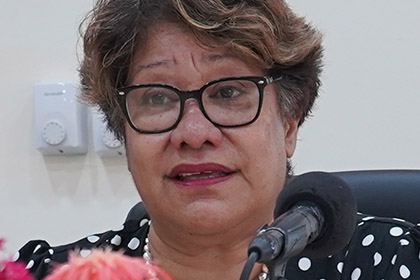
By Katalina Siasau
Ten cases of dengue fever have been confirmed in Tonga and are likely to increase, the Minister for Health, Hon. Dr ‘Ana ‘Akau’ola, said this morning. She urged the community to take precautions to eliminate the mosquitos that spread the disease. Dengue was found in Tongatapu, Vava'u and 'Eua.
On Tongatapu there are four cases in Manuka and one in Malapo; in Vava'u, four cases in Neiafu, and on 'Eua one case in ‘Ohonua.
The first dengue case was confirmed last week, 13 February and ten confirmed cases ranged in age from 10 to 17 years. The minister told a media briefing today that the number of dengue fever cases is likely to increase.
Senior Medical Officer Dr. Joseph Takai said that PCR tests had been sent to an Australian lab to determine the specific type of dengue fever present in Tonga. There are four types of dengue fever (types 1, 2, 3, and 4), with types 1 and 2 being more common in Tonga and other Pacific countries.
"Some affected individuals have been hospitalized, but their conditions are not severe"
Symptoms
The symptoms of dengue fever begin with a fever of 38°C or higher, often followed by vomiting, severe headache, muscle and joint pains, and rash spreading on skin.
Dr. Takai warned of danger signs, including abdominal pain in children, persistent vomiting, bleeding gums or nose, and blood in vomit. He advised that people with these severe symptoms should seek immediate medical care.
"Panadol is the safest, as well as Panadeine if pain is severe," Hon. Dr 'Akau'ola said.
She noted that aspirin and similar products should be avoided.
Infected mosquitoes
Dengue fever is a viral infection transmitted to humans through the bite of infected mosquitoes.
The Aedes aegypti mosquito is the primary vector responsible for dengue transmission, although the Aedes albopictus species, also found in Tonga, can also transmit the virus.
These mosquitoes, recognizable by one or two white stripes, primarily bite in the early morning, noon, and evening. Adult mosquitoes can fly up to 200 meters, and anyone within a 20-meter radius of an infected individual who is bitten is at high risk of contracting the virus.
Prevention
Lesieli Mahe from the Ministry of Health urged people to monitor and destroy breeding sites for these mosquitoes, such as freshwater storages such as water tanks, as well as plastic containers and pot plants.
Lesieli confirmed that ten houses of affected individuals, including a 200-meter radius around them, and health centers had been sprayed.
Hon. Dr ‘Akau’ola emphasized the importance of working together to stop the transmission of the dengue virus.
She recommended using nets for children while sleeping and taking precautions in workplaces and schools.
Due to limited resources, chemical spraying is currently restricted to the homes of confirmed cases and hospitals.
"The limited supply of chemicals has prevented spraying in schools at this time," she said.



